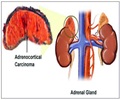The research work by University of Alberta pointed out that aggressive behavior in adults is linked to an individual's sensitivity to testosterone hormone.

"In our samples, less sensitive genes indicated more aggressive behavior, perhaps because the bodies of those people wound up producing more testosterone to compensate," he added.
Hurd believes that testosterone levels and sensitivity are particularly important during fetal development, particularly since testosterone acts to influence fetal brain development indirectly, through a different receptor after it has been converted to a slightly different chemical.
"More or less prenatal testosterone seems to have consequences throughout a person's entire lifetime," he said.
Hurd says the varying levels of testosterone sensitivity or exposure seen in the U of A volunteers is not related to extremely aggressive or criminal behavior.
In fact, the elevated aggression within this sample of students includes displays of aggression by one person against individuals through use of subtle, "gossip girl" styles of indirect aggression, he said.
Advertisement
Source-ANI











